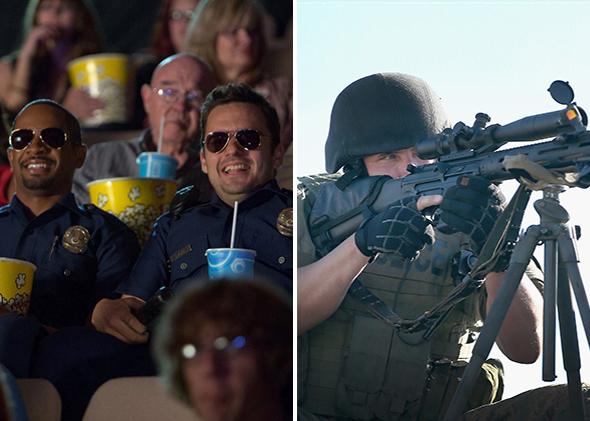The timing of the release of the buddy cop comedy Let’s Be Cops couldn’t be worse. To be fair, the actual movie Let’s Be Cops also couldn’t be worse.
On the other hand, maybe the movie’s tapping into something? Dumped into a midweek release in the heat of August, the movie earned more than $5 million on its opening day—just as Ferguson, Missouri disintegrated into militarized chaos after a police officer killed an apparently unarmed black man the weekend prior.
I didn’t expect much from Let’s Be Cops—the trailer sells the film as a silly, straight-to-DVD quality flick—but I was curious whether it might offer some insightful commentary on law enforcement, or at the very least how police are viewed in America. So I went to the Court Street theater in Brooklyn this afternoon to watch it, just me and eight other viewers, all coincidentally people of color. Was it a subversive satire of police authority? Would it change the way America thinks about the paramilitary organizations guarding its streets?
Nope.
The premise is simple: Justin (Damon Wayans, Jr.) and Ryan (Jake Johnson) are best friends and roommates who have turned 30 and have nothing to show for themselves. The former, a video game designer, has failed to sell his pitch to his colleagues for a new cop game called “Patrolman”; Ryan’s a slacker with no job. The two attend an alumni masquerade party—thinking it’s a costume party—in cop costumes. The sudden shift in the way everyone perceives them is played as a fantastical, life-changing epiphany: Women fling themselves at them and everyone does what they command. Ryan finds joy in watching everyone in their vicinity instinctively stop in their tracks when he shouts, “Freeze!” It inspires them to keep the ruse going.
As Nathan Rabin explained in his review of the film at The Dissolve, this silly story could have been made into a smart satire that manages to comment upon power and what a little bit of it can do to a person, as well as how race and gender factor into the dynamics between police and civilians. It doesn’t even attempt to do that. But viewing this lame comedy in the midst of our national awakening on the uses and abuses of law enforcement power still reminds me that current events can give even the junkiest Hollywood product an unexpected edge.
Here it’s because of the “comic” disparity between white Ryan’s enthusiasm about being a fake cop and black Justin’s. If this were Training Day—referenced in the film—Ryan would be Denzel’s power-hungry Alonzo and Justin, Ethan Hawke’s wary Jake, except without all the dark, sinister overtones. It’s actually kind of disturbing how incredibly high Ryan is off of the power: He learns police lingo and hand signals off of YouTube; he buys a cop car off Ebay; he antagonizes a dangerous Russian gangster and his crew (the villains in this story) and drags Justin into it with him. He even manages to convince a real cop, Patrol Officer Seagars (Rob Riggle), that he’s a sergeant. The two of them share a moment where they lust after the prospect of catching the Russian gangster and admit that they’re “obsessed with nailing” the guy. Justin, who’s looking on uncomfortably, wonders aloud, “What’s going on, guys?”
I seriously doubt the screenwriters Luke Greenfield (who also directed) and Simon Kinberg meant anything by this scene or the decision to cast the characters the way they did. But it’s interesting that the friend who sees each moment in which he somehow gets away with his fraud as the gateway to even bigger, and more dangerous (but fun!) hijinks, is white. In his own delusional world, pretending to be a cop is his path toward doing something with his life—on more than one occasion, Ryan explains to his friend, desperately, that he’s actually found a purpose in being a fake cop. Meanwhile, the friend who clearly wishes he wasn’t wrapped up in this mess is black. For him, the advantages that accompany being a cop—like the hot girl who is instantly turned on by the sight of your badge—don’t outweigh the serious jail time that awaits them once they’re found out. While the movie doesn’t interrogate the idea at all, Ryan is acting on the luxury he has as white male not to fear consequences in the same way that Justin does. Forget just impersonating a police officer—were the two of them to commit any crime in real life, Ryan would likely face a lighter sentence than Justin.
What makes the movie even more unsettling is how it concludes. Even though Seagars discovers they’re fakes, when Ryan and Justin help him take down the Russian mob, all is forgiven. Justin finally sells his video game pitch, of course. But Ryan somehow manages to land on the actual police force. And despite putting many innocent lives in danger, impersonating a cop, and destroying tons of property, he somehow gets to serve and protect the citizens of Los Angeles—for real this time.
Greenfield and Kinberg probably don’t even know it, but the entirety of Let’s Be Cops is an exercise in the advantage of being a white male—you can pretty much do anything you want and escape punishment for it. Huh—I guess the film’s awfully relevant after all.
Read the rest of Slate’s coverage of the protests in Ferguson, Missouri.
